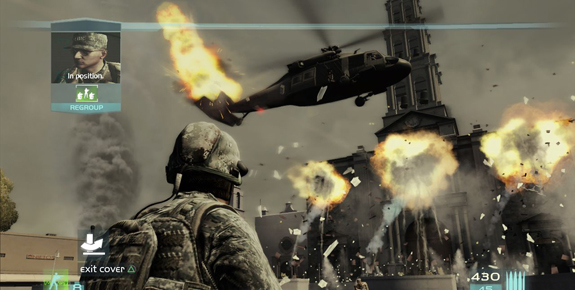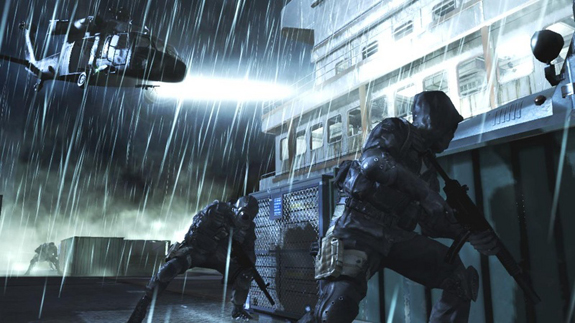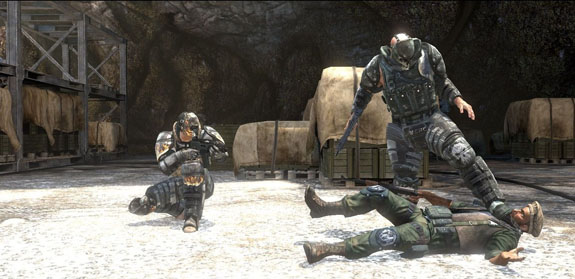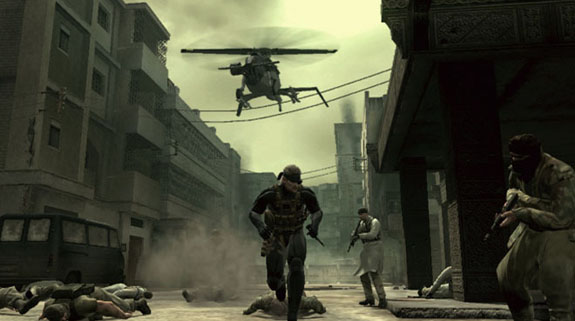This post has not been edited by the GamesBeat staff. Opinions by GamesBeat community writers do not necessarily reflect those of the staff.
Editor’s note: Although Daniel wrote this piece before Modern Warfare 2 came out, his points are still valid — more so in fact, now that we know why the Russians invade the US in the game (don’t worry, we won’t spoil anything that hasn’t been shown in trailers yet).
His article examines games based on real wars, fake wars, and everything in between. It’s a really interesting, in-depth read that may resonate with a lot of you war buffs out there. -Shoe

The last Modern Warfare 2 trailer was sufficiently surprising if nothing else. The images of the attack in DC probably got the proper “oohs” and “aahs” out of all of us that developer Infinity Ward expected, painting the campaign as a shocking story.
As someone who lives just outside of Washington DC, I think what Infinity Ward is doing is kind of ridiculous. None of us has played the game yet, but I have a feeling the segment isn’t being done for any truly serious reasons, and it’s made me even more disappointed at the storylines of both Modern Warfare games.
Part of what held up the believability of games like Call of Duty 2 in all their chaos was that they were based on, or at least inspired by, real events. When you were going through Stalingrad or Normandy, sure it wasn’t a 100% accurate representation of what actually happened, but you felt like you were going through a rendition of a part of history. That gave the games some gravity.
It’s great that Infinity Ward has broken away from World War II (apparently they wanted to do that with COD2). Now, however, they find themselves trying to think up their own scenarios for world-spanning warfare, and I just don’t think that what they’ve done carries the same weight.
The main thing that disappointed me with Ghost Recon: Advanced Warfighter 2 was how Ubisoft decided to create a fake conflict in Mexico in lieu of what they were doing previously in the Far East. The game itself was fun in its ways, but the whole reason why the Green Berets were there in Mexico in the first place felt very thin — more on that game further down.

Games like these need bad guys to kill, but they’re trying to find bad guys that won’t bring them controversy from the real world. The recent Tom Clancy games chose Mexicans, but in my opinion the Modern Warfare games did one worse by falling back on an old foe — Russian communists.
If you read up on the details of the how and why of the war depicted in Call of Duty 4, it’s all pretty shallow if you ask me. Basically it’s just a conspiracy between four guys to return Russia to communism. Just about the only thing separating COD4’s scenario from that of the film Crimson Tide or the original Ghost Recon is its U.S. invasion of an unnamed Middle Eastern country that turns out to be a decoy.
Although COD4’s scenario itself feels uninspired, what was pulled off well was the narrative style and delivery. Infinity Ward seems to be very much about keeping you in the moment, from the sinking ship to the AC 130 to the nuclear explosion. From the journals and the set pieces in COD2, you could tell that game was largely about the moment-to-moment experiences of individual soldiers and squads. That part they transplanted well into a modern setting, just not the overarching politics.

Possibly in response to comparisons with more realistic combat simulations, Infinity Ward has said that with Call of Duty they’re going for authenticity but not realism. They want their games to look realistic enough but still play like fun games. The first Marine mission in COD4 is presented with enough detail to make you wonder if this really is what the first days of the current Iraq conflict felt like. I just wish the macrocosm could feel that believable.
Of course we all know why this happens. Every war America has taken part in since World War II has been morally divisive on one level or another. WWII seems to have been the last modern “clean” war America fought in the eyes of the public (regardless of how “clean” WWII might have actually been). Games are still stuck with either fantasies or history that few currently alive remember.
Games like Six Days in Fallujah have been pelted to death by concern from parents and others automatically assuming that a video game will trivialize the events. Not being allowed to cover what books and film routinely cover with responsibility is part of what’s holding video games back. Who will open the door first, the concerned groups or game developers? This has all been gone over before, though, and pushing that envelope isn’t the only way for a game to feel like it’s with the times.

I am going to bring up, however, a game that did directly confront the current Iraq and Afghanistan wars. I guess not a lot of people remembered, but Army of Two actually had two missions put you in that conflict, and they didn’t treat it in the most serious way.
When you fought in Iraq in Army of Two, you mostly fought against guys holding AKs in T-shirts and jeans with cloths wrapped around their faces. The boss of that level was a guy with a machine gun who yelled, “Long live Saddam!” One type of enemy in Afghanistan was a guy strapped with a bomb who would run toward you flailing his arms like a chicken. From what I hear, there was even a part of the game where the main characters gave their opinions on the Blackwater incident. At the very least I appreciated Army of Two for not being afraid to take place in today’s world.
I’m not saying Infinty Ward’s Modern Warfare games have to take place in Iraq and Afghanistan in order to feel relevant. You can make up your fake wars, but if you place a game in a “what if” scenario and want it to feel “authentic,” then at least make it a believable “what-if” scenario.
 Let’s take another look at the Tom Clancy games.
Let’s take another look at the Tom Clancy games.
I played the original Ghost Recon for the first time last year looking for a shooter that felt a little more realistic in its mechanics, but I found the setting to be kind of laughable. All it’s about is some Russian communists trying to resurrect the Soviet Union. Sounds familiar right? The part that got me was how the scenario opened up with armed conflict in neighboring Georgia.
Right around the time I was playing the game in 2008 that whole business with Russia’s armed conflict with Georgia hit the news…and the original Ghost Recon takes place in 2008. What happens in the game is nowhere near what actually went down last year, but this proves that game at least examined politics that could actually end up happening.
The two most recent Ghost Recon games cover armed conflict in northern Mexico. The scenarios in the GRAW games were so shallow, I don’t even remember why they sent Green Berets there. But you can’t help but compare it to the drug war that’s going on down there now in the very same cities.
Those examples however are purely accidental — mostly just excuses to shoot people that turned surprisingly accurate to the real thing. There are games, however, that deliberately put themselves in fictitious scenarios and still manage to connect themselves to the real world.

I know a lot of people find the storylines of the Splinter Cell games dull, but I really appreciated the plots of the first and third games. They explored global situations that sounded plausible.
The fact that movies like Live Free or Die Hard would cover the possible effects of cyber warfare on American soil after the original Splinter Cell did it proves that game was on to something. The third game, Chaos Theory, combined that setup with the real complexities of Far Eastern politics. It felt as if Ubisoft had actually researched what would happen if Japan pushed the envelope of its own constitution in response to danger and how that would cause tension between the US, China, and North Korea.
A possible reason for why most games don’t even go this far is because frankly a lot of gamers don’t want it — or at least don’t ask for it. Like I said above, one thing holding this medium back is the perception that games will always be pure escapism. I have seen people, however, become attracted to games as fantastical as the original Mercenaries for how it examined Far Eastern politics because they happened to be studying that subject. It just creates another reason to be interested in a game as a product — just look at the Metal Gear franchise.
Metal Gear is one franchise praised for its commentary on today’s world. Metal Gear Solid was about a fictional special forces group and involved mechs and cyborg ninjas. What made the whole crazy thing stick was that the game took a look at how those things would affect and be affected by today’s politics, environmental issues, and the military industrial complex.
When 9/11 happened around the time Metal Gear Solid 2 was coming out, Hideo Kojima openly asked Americans to think about the event while playing the game — which itself was about terrorism in New York. Around the time that Blackwater was going on, PMCs was a very timely thing for Metal Gear Solid 4 to cover.
One of the editors at 1UP, however, also pointed out that the conflicts MGS4 thrust you into were essentially nameless. You didn’t know what militia was fighting against the PMCs or why. All you knew was that the current mission was in “The Middle East” or “South America.” South America is a pretty big continent.

Meanwhile, you have Infinity Ward’s Modern Warfare games about the same Russian extremists that were in every Tom Clancy setup of the ’90s. The only thing they could think of to do differently was have the Russian extremist leader call up his buddy in Unnamed-istan to distract and nuke the Americans.
Who knows? Maybe Infinity Ward will have thought up some well-researched, totally acceptable scenario for DC getting invaded. Some have already speculated something not unlike Brian Wood’s DMZ comic book.
We haven’t played the game yet, so we don’t know that they aren’t going to explore what the real effect on the population might be or something like that. From what I saw in COD4, though, it looks no better than the trivial settings I’ve seen in other games regardless of how awesome actually playing it is going to be.
I think the main reason for video game settings and stories being so trivial is that most game designers simply aren’t creative storytellers. I think that’s the central source of a lot of problems in the game industry. Infinity Ward themselves seem to know how to present that on-the-ground situation and create a really great game, but their overall scenarios, like those of a lot of games, feel almost out of a cartoon, even compared to other fiction.
That hasn’t convinced critics of gaming to stop looking at the medium like it’s for children.
This was cross-posted with http://redswirl.1up.com
